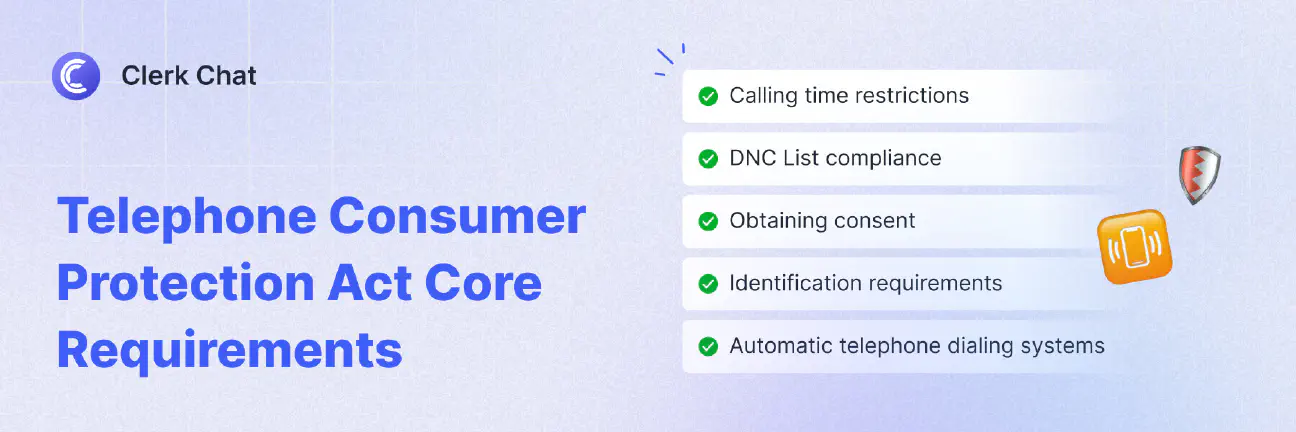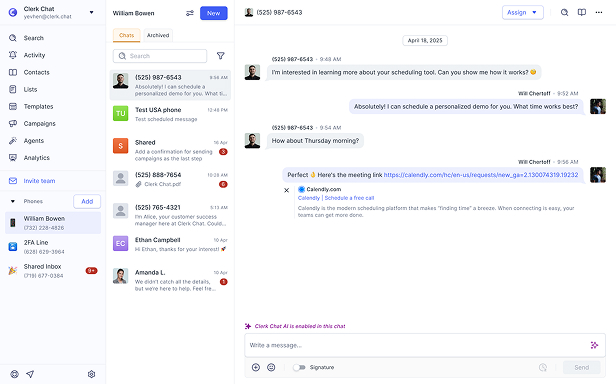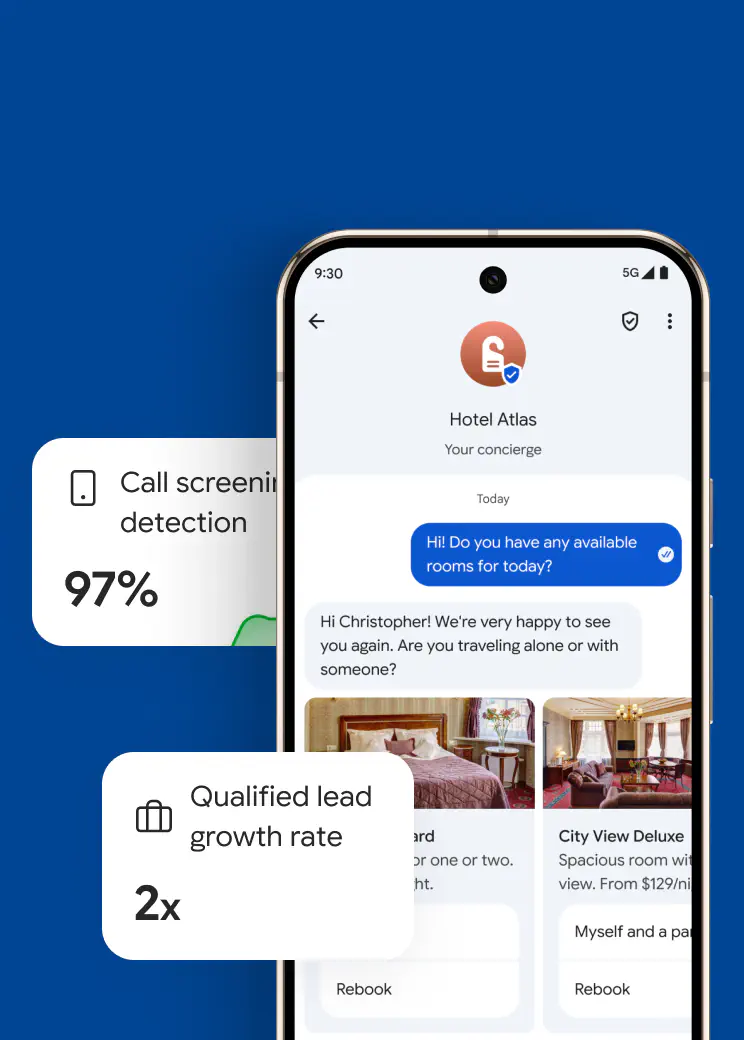SMS Marketing vs Email Marketing: Which is Best?
By Team Clerk Chat
- Published: November 11, 2024
SMS marketing vs email marketing: which promotional strategy should your company be investing in? Making the right choice can be more complicated than it seems.
On the one hand, email has been around for a lot longer, and there are countless platforms companies can use to enhance and automate their marketing strategies. On the other hand, while SMS marketing is a newer practice, it offers exceptional opportunities to engage and convert customers.
The reality is that both ways of communicating with your target audience have strengths and weaknesses. In this guide, we’ll tell you everything you need to know about the benefits of both solutions, so you can make the right choice for your marketing strategy.
You don't have to choose between SMS and email - use both!
Schedule a demo to discuss your needs.
What is Email Marketing?
Email marketing is one of the most popular forms of digital marketing. It involves using email to send messages to your customers, promoting your products or services, incentivizing consumer loyalty, and offering insights into your company.
The purpose of email marketing isn’t just to increase sales, the right strategy can help you nurture stronger relationships with leads and customers. The content in your emails can boost brand awareness, demonstrate thought leadership, and boost conversion rates.
The great thing about email marketing is that virtually everyone has an email address, meaning you have unlimited potential to reach potential customers. Plus, studies show that email marketing drives amazing results- the average ROI of email marketing is around $36 for every $1 spent!
What is SMS Marketing?
SMS marketing is a marketing strategy that involves sending content, promotions, alerts and other types of messages to customers through text. Using business text messaging platforms, companies can send personalized messages to customers at scale, reaching them in an instant.
In the battle of SMS marketing vs email marketing, a major benefit of an SMS strategy is that you’ll have a direct line of contact with your target audience. You don’t have to wait for customers to check their inbox to see your messages, and you can reach consumers a lot faster.
People today are constantly connected to their smartphones, which is one of the reasons why SMS marketing has such high engagement rates. In fact, many people who use SMS marketing platforms find they achieve better engagement rates than they would with email.
SMS vs Email Marketing: The Pros and Cons
One of the reasons why it’s so difficult for many companies to decide between SMS and email marketing, is that both options have advantages and disadvantages to consider. Let’s look at the pros and cons of email vs SMS marketing.
The Advantages of Email Marketing
- Flexibility: Email gives companies the freedom to share as much information as they like in each message. Although it’s important not to overwhelm your audience with content, you won’t have the same character limitations you would have with SMS marketing.
- Reach: Not only do most people worldwide have an email address, but 61% of consumers rely on email as their main method of communicating with brands.
- Customization: With email marketing platforms, companies can easily adjust the templates of their messages. They can add branded elements like logos, as well as images, videos, and links to email notifications.
The Disadvantages of Email Marketing
- Effort: It takes a lot of work and experimentation to create compelling emails that customers actually want to read. You’ll need to invest time and effort into creating highly personalized emails that drive powerful results.
- Engagement: The average person receives around 121 emails every day. It can be very difficult for companies to stand out in a crowded email inbox, which is why engagement rates can be lower with email campaigns.
- Deliverability issues: While SMS deliverability can vary, emails are exposed to more filters that can make it harder to reach your customers. Simply using the wrong word in an email subject line can cause your message to be sent directly to spam.
The Advantages of SMS Marketing
- Direct contact: Most people have their smartphones nearby at all times, meaning it’s easy to reach your customers wherever they are in an instant. You don’t even need your target audience to be connected to the internet with SMS.
- Customer preference: People love communicating by text. With SMS marketing strategies, you can even enable two-way communications, for in-depth conversations with customers.
- Conversion rates: Although email can drive conversions, SMS carries an average conversion rate of 29%, almost double that of email (15.2%). An SMS marketing strategy can deliver better ROI for your marketing strategy.
- Simplicity: The brevity of SMS as a communication strategy makes it relatively easy to create a compelling SMS campaign with minimal effort. With the right A2P messaging solution, you can even leverage convenient templates to accelerate message creation.


The Disadvantages of SMS Marketing
- Compliance: When it comes to SMS marketing vs email marketing, both options are affected by compliance considerations. However, remaining compliant with SMS guidelines can be more complex. You’ll need to consider everything from TCPA mandates to carrier guidelines, industry-specific regulations, which can change rapidly.

- Sourcing phone numbers: People aren’t always comfortable handing out their phone numbers to companies. This can make it difficult to collect leads for your SMS marketing strategy if you don’t offer the right incentives.
- Limited customization: While you can leverage templates, emojis, and other features with an SMS marketing platform, it’s much harder to customize your messages. You can’t always embed videos and images into texts, for instance.
SMS vs Email: Statistics and Comparison Points
When you’re considering SMS marketing vs email marketing for your business, there are various points you’ll need to consider. Looking at statistics and insights into how each channel performs in terms of open rates, engagement, conversions, and more can help you make the right choice.
SMS vs Email Marketing: Engagement Rates
Engagement is a crucial consideration for any marketing strategy. If you can’t engage your leads, you’re not going to convert them into paying customers. Overall, SMS benefits from a much higher engagement rate than email marketing.
You don't have to choose between SMS and email - use both!
Schedule a demo to discuss your needs.
First, text messages have an average open rate of more than 98%, compared to only 19.8% for emails. Additionally, studies show that most customers open texts within 90 seconds of receiving them, making SMS an excellent way to share time-sensitive information with customers.
Aside from higher open rates, SMS also has a higher response rate than email (45% compared to 6%), making it an excellent tool for not just marketing, but also customer service. Plus, the click-through rate of SMS messages is higher too.
More people are likely to click on a link in an SMS message, whereas email marketing only has an average click-through rate of around 1.7%. This means your chances of earning website traffic and conversions is much higher with SMS.
Email vs SMS Marketing: Cost and Complexity
While both email and SMS marketing can be cost-effective strategies, there are a few differences in terms of pricing and complexity. SMS messages can be more costly to send than emails, as you’ll be required to pay a fee to a phone carrier. However, enterprise text messaging platforms can also be cheaper to use at scale than some email automation platforms.
From a complexity perspective, SMS poses more challenges connected to compliance. Companies need to ensure they’re not only adhering to things like the CAN-SPAM act, but also consider the messaging mandates associated with their industry.
However, creating and designing high-quality emails can be a lot more complicated than designing great SMS campaigns. Anyone can use SMS templates in a platform like Clerk Chat to create a great message in seconds, without any specific technical skills. Building email templates and filling them with high-quality content often takes more time and expertise.
Email vs Text Marketing: Customization and Personalization
Both emails and text messages can be used in a variety of ways to share information with customers. You can use both channels to promote specific products and services, nurture leads with automated campaigns, share offers, and highlight upcoming deals. You can even send transactional text messages and emails that enhance customer experiences, like order confirmation messages.
However, email does offer a few more options for customization, allowing users to explore a range of formatting and design features, as well as interactive elements. You can use various colors, images, and even embedded videos to capture attention with an email.
With SMS, you’re limited mostly to text, links, and emojis, and you’ll have specific character restrictions to consider. However, you can still personalize SMS messages, showcase your branding, and infuse each message with your company’s unique tone of voice.
SMS Marketing vs Email Marketing: How to Choose
So, how do you choose between SMS and email marketing? Ultimately, there’s no one-size fits all approach. Both solutions offer a fantastic way to connect with your customers and increase conversion rates. Here are a few steps you can take to ensure you’re investing in the right strategy.
1. Get to Know Your Audience
Understanding your target audience and their specific preferences is crucial when comparing SMS marketing vs email marketing benefits. Every consumer base has its own specific preferences to consider when it comes to receiving marketing communications from companies.
In many cases, younger customers will prefer SMS marketing, as they already use conversational SMS solutions to communicate with companies and request support. However, older consumers, or customers from different backgrounds may prefer to receive all your messages via email.
You might even find that your customers prefer to receive SMS messages for certain things – like alerts about limited-time promotions, but want emails for other promotional messages, like detailed overviews of new products and releases.
2. Know Your Marketing Goals
Defining your marketing goals is another key step in making the right choice between text message and email-based marketing.
If your biggest goals right now are to educate your consumers or provide them with access to in-depth information about products and solutions, email might be the best choice. Alternatively, if your goal is to increase conversion rates and revenue, improve customer lifetime value, and boost engagement rates, then SMS marketing could be a better pick.
When setting goals, think carefully about the types of messages you’re going to be sending. Will they be time-sensitive, concise, and simple, or comprehensive and filled with high-quality visuals?
Identifying specific goals will help you decide which marketing channel to use for each campaign. It will also ensure you can effectively track the results of your email and SMS strategies to identify whether they’re delivering the right outcomes.
3. Consider Your Resources
When evaluating text message marketing vs email marketing, you’ll also need to think about the resources and budget you have access to.
Email is typically cheaper than SMS, so if your marketing budget is extremely limited, you might prefer to stick with email initially. However, you may find that as your budget grows, it makes more sense to include SMS in your campaigns through integrations between email platforms and SMS automation tools.
It’s also worth thinking beyond financial resources. For instance, if you want to create highly unique, branded emails, filled with engaging copy, you might need to invest in graphic designers, copywriters, and other experts.
Alternatively, a simple text messaging solution for small businesses generally won’t require as much expertise when it comes to creating campaigns. However, you may need to invest more effort into ensuring you preserve text messaging compliance, learning about things like 10DLC vs short codes for messaging strategies, and adapting to industry standards.
4. Stay Flexible
Finally, it’s worth remembering that in today’s world, companies don’t necessarily need to choose between SMS or email marketing. There’s nothing stopping you from investing in emails and SMS to connect with, convert, and nurture your customers.
Experimenting with both options, while ensuring you follow specific compliance rules, such as adhering to SMS opt-out requirements, can help you to make better decisions about how to use your marketing budget in the future.
With the right platform, like Clerk Chat, you can use SMS to send promotional messages and transactional messages to customers, and align your text strategy with your email campaigns through integrations. Plus, you can experiment with various forms of automation, conversational AI strategies, and more as your business and customer base evolves.
SMS Marketing vs Email Marketing: Final Thoughts
Overall, both SMS marketing and email marketing are incredible tools for businesses looking to strengthen relationships with customers and increase sales. Email marketing can be more affordable and offer more customization options, but SMS benefits from incredible engagement rates, a higher ROI, and a fantastic opportunity to connect directly with customers.
Instead of struggling with the battle of deciding between SMS marketing vs email marketing, why not explore both strategies? With Clerk Chat, you can unlock all the benefits of SMS marketing, text-based customer service, and SMS automation. Plus, because our platform integrates with a range of tools, you can bridge the gaps between your SMS and email strategies.
Take your marketing communications to the next level, with an innovative SMS marketing solution today. Schedule your free demo of our leading platform.
In this article:
Ready to use your business number for text messaging?
Thousands of businesses are already experiencing the power of conversational messaging through SMS. Join us. Free trial and paid tiers available.
Get Started#Subscribe
Get product updates in your inbox
Tutorials, features, and Clerk Chat news delivered straight to you.



